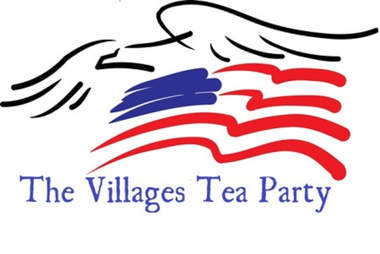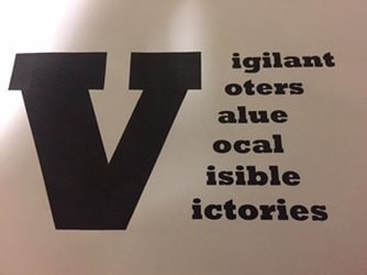TVCM Presents: What's Next Aileen?
 Wallace Bruschweiler Wallace Bruschweiler
May 24, 2019
What's Next Aileen? Wallace Bruschweiler Wallace S. Bruschweiler, Sr. is a quadri-linguist and subject matter expert in counter-terrorism and national security issues. He has over 30 years’ experience operating in Europe, Middle East, and North Africa. He is a results-oriented security executive, analyst, strategist and problem-solver with extensive expertise and 30+ years of achievement in complex domestic and international security and intelligence situations in a range of venues. He possesses broad cultural knowledge and awareness, derived from worldwide first-hand experience. Mr. Bruschweiler is a fluent speaker, reader and writer of English, French, German and Italian, and a conversational speaker of Russian. Election to the European Parliament is being held between 23 and 26 May 2019 and is the ninth parliamentary election since the first direct elections in 1979. As of 2018, a total of 751 Members of the European Parliament represent more than 512 million people from 28 member states.
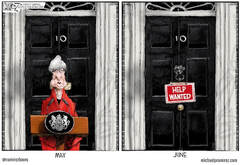
EU ELECTION RESULTS
178 Populists 152 Socialists 108 Liberals 67 Green 61 Conservatives 55 Super-nationals 53 Democrats 39 Left 31 Others 7 No affiliation |
May 24, 2019
Interview with Bruschweiler, European Union Elections and the Future of the EU Dates: Thu, May 23, 2019 – Sun, May 26, 2019 Plus history of Notorious Italian Politican Giulio Andreotti 
http://usatransnationalreport.org
USA Transnational Report is a citizens-driven news and analysis website that focuses on threats to the United States’ security. |
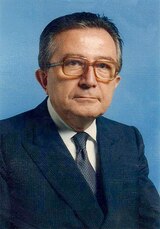
Giulio Andreotti OMI SMOM OCSG OESSH (Italian: [ˈdʒuːljo andreˈɔtti]; 14 January 1919 – 6 May 2013)[2] was an Italian politician and statesman who served as the 41st Prime Minister of Italy (1972–1973, 1976–79 and 1989–92)[3] and leader of the Christian Democracy party; he was the sixth longest-serving Prime Minister since the Italian Unification and the second longest-serving post-war Prime Minister, after Silvio Berlusconi. Andreotti is widely considered the most powerful and prominent politician of the so-called First Republic. Beginning as a protégé of Alcide De Gasperi, Andreotti achieved cabinet rank at a young age and occupied all the major offices of state over the course of a forty-year political career, being seen as a reassuring figure by the civil service, business community, and Vatican. In foreign policy, he guided Italy's European Union integration, and established closer relations with the Arab world. Admirers of Andreotti saw him as having mediated political and social contradictions, enabling the transformation of a substantially rural country into the fifth-biggest economy in the world. Critics said he had done nothing against a system of patronage that had led to pervasive corruption. Andreotti staunchly supported the Vatican and a capitalist structure while opposing the Italian Communist Party.[4] Following the popular Italian sentiment of the time, Andreotti also supported the development of a strong European community paying host to neo-liberal economics.[4] Though Andreotti belonged to the right-wing correnti, he was not adverse to the implementation of the European Social Fund and Regional Fund in building the European economy.[4] At the height of his prestige as a statesman, Andreotti was subjected to damaging criminal prosecutions. Charged with colluding with Cosa Nostra, courts couldn't prove that he had maintained his links with them after 1980, and ruled the case out of time.[5] The most sensational allegation came from prosecutors in Perugia, who charged him with ordering the murder of a journalist. He was found guilty at a trial, which led to complaints that the justice system had "gone mad". After being acquitted of all charges (actually, in part due to statute-barred limitations),[5] Andreotti remarked, "Apart from the Punic Wars, for which I was too young, I have been blamed for everything that's happened in Italy." Andreotti served in numerous ministerial positions, including as Minister of the Interior (1954 and 1978), Minister of Finance (1955–58), Minister of Treasury (1958–59), Minister of Defence (1959–66 and 1974), Minister of Planning and the Budget (1974–76) and Minister of Foreign Affairs (1983–89) and was a Senator for life from 1991 until his death in 2013.[3] He was also a journalist and author. Andreotti was sometimes called Divo Giulio (from Latin Divus Iulius, "Divine Julius", an epithet of Julius Caesar after his posthumous deification). 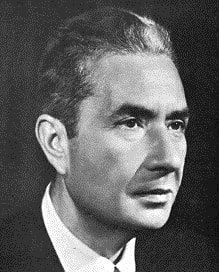
Aldo Moro
38th Prime Minister of Italy Aldo Romeo Luigi Moro (Italian: [ˈaldo ˈmɔːro]; 23 September 1916 – 9 May 1978) was an Italian statesman and a prominent member of the Christian Democracy party. He served as 38th Prime Minister of Italy, from 1963 to 1968, and then from 1974 to 1976. He was one of Italy's longest-serving post-war Prime Ministers, holding power for a combined total of more than six years. Due to his accommodation with the Communist leader Enrico Berlinguer, known as the Historic Compromise, Moro is widely considered one of the most prominent fathers of the Italian centre-left and one of the greatest and most popular leaders in the history of the Italian Republic. Moro was considered an intellectual and a patient mediator, especially in the internal life of his party. He was kidnapped on 16 March 1978 by the Red Brigades and killed after 55 days of captivity.Aldo Moro was born in 1916 in Maglie, near Lecce, in the Apulia region, into a family from Ugento. His father was a school inspector, while his mother was a teacher. At age of 4, he moved with his family to Milan, but they soon moved back to Apulia, where he gained a classical high school degree at Archita lyceum in Taranto. Until 1939, he studied Law at the University of Bari, an institution where he was later to hold the post of professor of Philosophy of Law and Colonial Policy (1941) and of Criminal Law (1942). In 1935, he joined the Italian Catholic Federation of University Students (Federazione Universitaria Cattolica Italiana, FUCI) of Bari. In 1939, under approval of Giovanni Battista Montini whom he had befriended, Moro was chosen as president of the association; he kept the post until 1942 when he was forced to fight in the World War II and was succeeded by Giulio Andreotti, who at the time was a law student from Rome. During his university years, Italy was ruled by the fascist regime of Benito Mussolini, and Moro took part in students competitions known as Lictors of Culture and Art organised by local fascist students' organisation, the University Fascist Groups.[1] In 1943, along with other Catholic students, he founded the periodical La Rassegna, which was published until 1945.[2] In July 1943, Moro contributed, along with Mario Ferrari Aggradi, Paolo Emilio Taviani, Guido Gonella, Giuseppe Capograssi, Ferruccio Pergolesi, Vittore Branca, Giorgio La Pira, Giuseppe Medici and Andreotti, to the creation of the Code of Camaldoli, a document planning of economic policy drawn up by members of the Italian Catholic forces. The Code served as inspiration and guideline for economic policy of the future Christian Democrats.[3][4] In 1945, he married Eleonora Chiavarelli (1915–2010), with whom he had four children: Maria Fida (born 1946), Agnese (1952), Anna, and Giovanni (1958). In 1963 Moro was transferred to La Sapienza University of Rome, as a professor of the Institutions of Law and Criminal Procedure. __________________________________________ 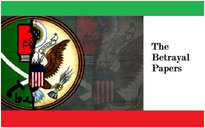
The Betrayal Papers
The Muslim Brotherhood is a fundamentalist Islamic organization recognized by many as the parent group of many of today’s terror organizations. While the Muslim Brotherhood’s goal is a worldwide Islamic State (aka, Caliphate), it has established influence over the highest levels of American government. This revelation has become an indisputable fact for those who examine the evidence. The Betrayal Papers is a six-part, research and multimedia campaign that presents this evidence. It demonstrates the incredible influence that the Muslim Brotherhood exerts over the Obama administration, many members of Congress, and on American policy foreign and domestic. This series has been meticulously researched by a team of journalists, national security bloggers, and retired military operatives. All of the information contained in this critical and informative campaign is compiled using Open Source Intelligence (OSINT) best practices. The Betrayal Papers: Below please find links to both print and audio versions of The Betrayal Papers. Part I – Under Obama, the US Captured by the Muslim Brotherhood [Print | Audio | Video] Part II – In Plain Sight – A National Security “Smoking Gun” [Print | Audio | Video] Part III – Obama’s Scandals and Assaults on Freedoms Explained [Print | Audio] Part IV – A New Genocide [Print | Audio] Supplemental Article – And the Press Says Nothing… [Print ] Part V – Who is Barack Hussein Obama? [Print | Audio | Video] Part VI – The Chicago Connection [Print | Audio] Additional Formats To download a PDF file of all six parts (plus supplemental), click here. A Kindle edition of The Betrayal Papers is available here. A PowerPoint Presentation in PDF format is available here. The Betrayal Papers is a product of the Coalition of Concerned Citizens. Contributing authors are available for interviews to interested radio shows and television programs. Andrea Shea King, Dr.Ashraf Ramelah, Benjamin Smith, Brent Parrish, Charles Ortel, Denise Simon,Dick Manasseri, Gary Kubiak, Gates of Vienna, Hannah Szenes, IQ al Rassooli, Right Side News, Marcus Kohan, Mary Fanning, General Paul E. Vallely, Regina Thomson, Scott Smith, Sharon Rondeau, Terresa Monroe-Hamilton, Colonel Thomas Snodgrass, Trevor Loudon, Wallace Bruschweiler, and William Palumbo. |
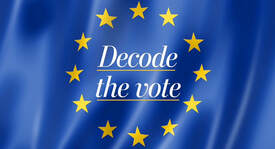
Five things to know about Europe’s surprisingly dramatic parliamentary elections
(Washington Post illustration/iStock) By Ruby Mellen May 23 at 6:00 AM Across Europe, voting begins Thursday in European Parliament elections, which will continue through Sunday. The elections are hotly anticipated across the continent, with many people wondering how the results will affect the future of the European Union and the bloc’s dealings with the rest of the world. With the help of our correspondents in Europe, we answer five key questions about the elections and the legislative body. What is the European Parliament? The 751-member legislature is most notable for being, as Deutsche Welle puts it, “the only democratically legitimized supranational institution in the world.” In other words: It is the only assembly made of various countries where the people of those countries can directly vote for their representatives. It is also notable for the large numbers of voters in its elections. More than 370 million people are eligible to vote, making these the second largest elections in the world, behind India’s. Members of European Parliament are sent as representatives of the 28 countries in the E.U. Each country decides how the elections are held. Anything goes as long as the ballots are secret and women and men can both vote. (The voting age is 18 everywhere but Austria, where it is 16.) Seats are apportioned to each country according to the size of its population. Germany, the E.U.’s most populous state, has 96 representatives, while small countries like Cyprus, Malta and Luxembourg have six each. That said, members of the European Parliament — or MEPs — do not always vote along nationality lines. Once elected to the European Parliament, they join larger parties and coalitions. MEPs are elected to five-year terms and have a say in the bloc’s finances, international presence and general direction. Since the Lisbon Treaty of 2009, which expanded the body’s powers, the European Parliament has appointed the head of the European Commission, the E.U.’s executive body, approved or rejected international agreements such as a recent trade pact with Singapore, and decided on the E.U.’s full budget. The body is involved in decisions on a vast array of topics, including agriculture and fisheries, environmental issues and migration policies. Who are the key players to watch for in these elections? There are eight political groups in the European Parliament. Forming a group requires at least 25 members from at least seven countries. The largest groups are the center-right European People’s Party (EPP) and the center-left Socialists and Democrats. Both are expected to lose seats as voters show an appetite for more-extreme views on the left and the right. The EPP is likely to lose seats to more-nationalist and Euroskeptic parties. This will be especially crucial in the case of Hungarian Prime Minister Viktor Orban’s Fidesz party. The EPP suspended Fidesz in March over its rejection of E.U. migration policies. Now Orban is calling for the group to join forces with far-right parties such as Italian Interior Minister Matteo Salvini’s League party, and French politician Marine Le Pen’s National Rally. The head of the EPP has already ruled out such an alliance, but, as Politico noted, Orban has said “he would find it hard to stick with the EPP if it forms an alliance with ‘pro-migration’ parties on the left.” It’s also worth keeping an eye on the fortunes of Britain’s Euroskeptic Brexit Party, which is led by Nigel Farage. A recent poll showed the Brexit Party has more support than Britain’s mainstream liberal and conservative parties combined — a little bit ironic considering that if the party had its way, Britain would already be out of the E.U. and not be represented in European Parliament at all. Meanwhile, on the left, other parties are expected to gain ground. According to the Associated Press, polling in April showed that the progressive Alliance of Liberals and Democrats for Europe, backed byFrench President Emmanuel Macron, is projected to gain eight seats, bringing its number to 76, and that the Green party could win 57 seats, five more than it now holds. Ultimately, the new Parliament could reflect what is occurring in governments all around Europe: a weakening of the center that is forcing political realignment on the major issues shaping the world. Yep. This is an election few thought would occur in Britain, given that the country voted three years ago to leave the E.U. and was to have quit the bloc two months ago. The questions are understandable. Will Britain’s 73 new representatives to the E.U.’s legislative body serve for days, weeks or years? Who knows? The chaos is made more sensational by the forecast that this nascent, single-issue party is going to blow everyone else out of the water, with the potential to influence how Brexit turns out and how long Prime Minister Theresa May stays in office. The demands of the Brexit Party seem simple: Get us out of the E.U. Now. Honor the 2016 referendum result. A big win for the Brexit Party could push May and her Conservatives to hurriedly pass a deal before parliamentarians take up their seats in July, or, as Farage prefers, leave the E.U. with no deal. Writing in the Guardian, former Labour prime minister Tony Blair described the stakes: “This is not a vote to choose a prime minister or a government. It is a vote for the Farage Brexit — or against it.” Alternatively, a good showing from the anti-Brexit Liberal Democrats or Change UK might embolden those in the British Parliament who want a second referendum on Brexit. Since the last election in 2014, the E.U. has been hammered by a refugee crisis, multiple mass-casualty terrorist attacks, a vote by the British people to exit the bloc, a security scare fueled by the Kremlin and a fitful economic recovery after the global financial crisis. Such issues are pulling voters to the fringes, and far-right and other parties that are hostile to the E.U. appear poised to control more seats than ever before. From grand palazzi in Rome to Art Nouveau villas in Budapest, Europe’s anti-migration right-wingers have been prepping their battering rams to knock down the doors of the European Parliament. No one expects them to win a majority, but their aim is less to legislate than to obstruct. A greater far-right presence could have a disproportionate effect on how the E.U. functions, putting the far right in a position to play spoiler. And a legislature with less ability to get things done would feed the narrative of the E.U.'s nationalist critics, who argue that the bloc is fundamentally broken. But for Europe’s critics to wield maximum influence, they will need to work together — something they have failed to do so far. It doesn’t seem likely. At least yet. Parliament, politicians, security services and social media companies that were bracing for an onslaught from Russia have been surprised that, so far, they seem to have avoided one. Experts are cautious about saying Russian interference has been neutralized, but the anxiety has shifted somewhat inward, as many of the disinformation tactics pioneered by Russia have been domesticated and are being replicated on both extremes of the political debate in Europe. That said, Russia is still working openly to promote political division in Europe. The Sputnik news agency has offered wall-to-wall coverage of the “yellow vest” protests that have shaken France. The German-language homepage of RT, formerly Russia Today, recently featured a banner debunking “myths” that the former West Germany was superior to communist East Germany. But the scale of what has been identified is nothing compared with the past — or with what the Europeans had anticipated. In part, far-right parties in Europe have not needed Russia, because some of their domestic supporters have mimicked Russia’s strategy of promoting disinformation and amplifying it through the use of automated social media accounts. Read more: In what may be Britain’s last European election, Nigel Farage’s new Brexit Party is expected to dominate Far-right parties hope to undermine E.U. by winning European elections Europe’s far right says it is united. But can ultranationalists find a way to work across borders? ___________________________________________ |

What's Next Aileen?
Host: Aileen Milton Founder & President of TVCM Filmed By: The Villages Conservative Media thevillagesconservativemedia.com 
FreedominAmerica.us
|

GOT ROKU ADD Freedom in America to your Roku Channel Selection Sign up and add owner.roku.com/add/BIGVFIA01 GET ROKU To Watch The Villages Conservative Media & The Villages Tea Party on your TV After you sign in to your Roku account, it should take you to the "ADD CHANNEL" area. Failing that, sign into your Roku account and go to this page: https://my.roku.com/account/add The code is BIGVFIA01 Enter it in the space and then hit ADD CHANNEL. You might have to reboot your Roku device to get it to install. Some do, some don't. When you get it, it will be at the very bottom of your channel list. You can move it by hitting the '*' function button and move it to where you want it to be. |
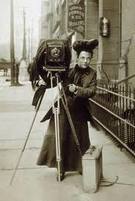 Jessie Tarbox Beals
Jessie Tarbox Beals
Here’s a photograph of Jessie Tarbox Beals, America’s first female photojournalist, with her camera on a street a century ago. While most female photographers of her time shot photos from the peace and safety of photo studios, Beals ventured into the world of photojournalism and made a name for herself through her tenacity, self-promotion, and freelance news photos.


